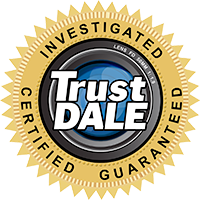The Effects of Salt on Concrete

Salt: How It Affects Your Concrete
Salting the roads is a common occurrence once winter hits, especially in the southern states of Tennessee, Kentucky, and Alabama. Large trucks coat the roads with a specialized salt -- known as rock or road salt -- that is meant to improve traction. In addition to roads, rock salt can be used on any concrete surface, such as sidewalks, to stop a vehicle, bicycle, or person from slipping on the ice and snow. It might be helpful in preventing accidents, but rock salt does indirectly damage concrete.
As the snow and ice begin to melt, the porous concrete will soak it up. This melted snow and ice can refreeze once inside the concrete, creating cracks and gaps in the concrete. Salt also naturally lowers water's freezing point and increases the pressure of frozen water, making the freeze-thaw cycle much more intense. Melted ice also holds 10 percent more water than usual, with the extra water contributing more to hydrostatic pressure.
Additionally, rock salt is full of chemicals, such as sodium ferrocyanide and ferric ferrocyanide, to prevent issues like the salt clumping together while it's being stored. As the salted snow and ice melts and soaks into the concrete, these chemicals are also absorbed. The calcium hydroxide in the concrete then mixes with the calcium chloride in the salt to create calcium oxychloride (CAOXY). The CAOXY crystals expand inside the concrete, leading to fissures and cracks or gaps in the concrete. Cracked concrete can lead to tripping and falling, making it dangerous to have around your home.

How Road Salt Works
Contrary to popular belief, road salt does not melt ice. Instead, it lowers the freezing point of water. This makes it very difficult for ice and snow to stick to the road and create dangerous driving conditions as well as slips and falls on sidewalks or other concrete structures. With more than 135 million vehicles registered for driving in the United States, it is imperative to improve the dangerous driving conditions that occur when snow and ice fall. While road salt is the more popular choice, there are alternatives that will not deteriorate concrete.
Alternatives to Rock Salt
As mentioned above, rock salt is not the only way to keep ice from forming on your concrete. You can also use:
- Sand: It can be used instead of salt to create traction and can even be mixed with salt for added traction. However, sand isn't the most popular choice as it can be quite expensive to clean off roads and sidewalks. It can also damage infrastructure, as it may flow into drainage systems, creating clogs.
- Cheese and Pickle Brine: This salty liquid works the same as rock salt; however, the salt is trapped in the liquid instead of being stored in the larger crystals of rock salt. The brine will also soak into the concrete, forming a barrier of natural antifreeze and creating a top layer that prevents snow from sticking to the concrete.
- Beet Molasses: Produced from refining beet sugar, beet molasses' sugar content lowers the freezing temperature of water much like salt does. However, when mixed with small quantities of salt, the sticky mixture maximizes the effect of the sale and reduces salt runoff.

Rock Salt vs. Table Salt
While you wouldn't want to keep rock salt in your pantry, it is not much different from your average table salt. The major differences between rock salt and table salt are that rock salt contains more additives and table salt is much more fine than rock salt. The salt you find on the roads in the winter contains mineral impurities that may make it appear brown or gray.
Let Us Help!
If the concrete around your home is suffering the ill effects of salt damage, such as cracking, flaking, or peeling, we can be of assistance! At Frontier Foundation & Crawl Space Repair, we have various services that can help. Specifically, we utilize the NexusPro solution, which is a durable sealant that cures quickly to seal up cracks and gaps in your concrete. Contact us today for a free, no-obligation estimate!
 4.8
4.8 



